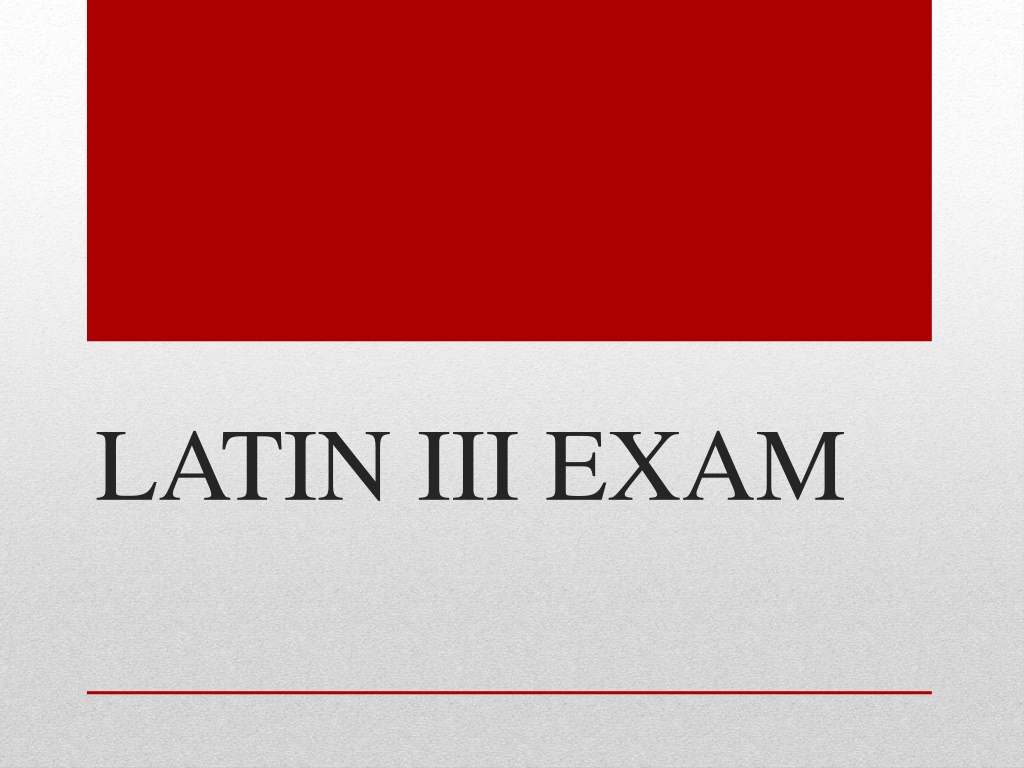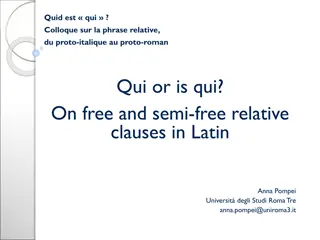Latin III Exam and Grammar Overview
This Latin III exam study guide covers various grammar topics including nouns, predicate nominative with passive verbs, possessive quantity partitive, special uses of dative and ablative cases, locative case, pronouns, positive comparative superlative forms, and correlatives. The guide provides explanations and examples for each topic to help students prepare for their exams effectively.
Download Presentation

Please find below an Image/Link to download the presentation.
The content on the website is provided AS IS for your information and personal use only. It may not be sold, licensed, or shared on other websites without obtaining consent from the author.If you encounter any issues during the download, it is possible that the publisher has removed the file from their server.
You are allowed to download the files provided on this website for personal or commercial use, subject to the condition that they are used lawfully. All files are the property of their respective owners.
The content on the website is provided AS IS for your information and personal use only. It may not be sold, licensed, or shared on other websites without obtaining consent from the author.
E N D
Presentation Transcript
predicate nominative with passive verbs, e.g., appell , f Nominative:
Possessive quantity partitive with caus or gr ti description objective Genitive:
possession purpose and reference (double dative) agent with special adjectives, e.g., am cus, carus, similis with special verbs, e.g., imper , p re , place , praefici , pr sum Dative:
place to which (without prepositions) object of prepositions, e.g., apud praeter super Accusative:
place from which (without prepositions) ablative absolute description separation cause SID SPACE Ablative:
The locative case is used for names of towns, cities, small islands and the nouns domus, rus and humus and never use in or ad to indicate place where. The locative case never uses a preposition. Forms of the Locative Case For first and second declensions, locatives resemble the genitive in singular forms and the dative/ablative in the plural. For the third declension, the locative resembles the ablative in the locative singular and plural. Occasionally the locative singular may resemble the dative singular. Locative:
ipse, HIM/HERSELF dem; THE SAME aliquis, SOMEONE/ANYONE qu dam, A CERTAIN quisque WHOEVER PRONOUNS:
POSITIVE COMPARATIVE SUPERLATIVE BONUS/BENE MELIOR/MELIUS OPTIMUS/OPTIME MALUS/MALE PELIOR/PELIUS PESSIMUS/PESSIME MAGNUS/MAGNOPERE MAIOR/MAIUS MAXIMUS/MAXIME PARVUS/PAULO MINOR/MINUS MINIMUS/MINIME MULTUS/PAULUM PLUS/PLUS PLURIMUS/PLURIMUM ADJECTIVES/ADVERBS:
correlatives, s ve...s ve, vel...vel, nec nec Et et Neque neque Aut aut Modo modo s , nam, enim, igitur, autem, tamen, neque, ut CONJUNCTIONS:
-ne, -que, -ve -cum ENCLITICS:
deponents irregular, f , m l , vol , n l impersonal, oportet irregular imperatives, d c, d c, fac, fer, VERBS:
indirect statement with present and past tense main verbs
hortatory, jussive indirect command, purpose clause, result clause, indirect question cum clauses subjunctive mood
Expressions of purpose (ad, caus , gr ti ) Active and passive periphrastic Expression of obligation gerunds and gerundives,
vtexcdere, in m trim niumd cere, c nsilium capere in animo vertit Iter facit Nomen est mihi Gratias ago tibi IDIOMS:
III. CULTURE AND CIVILIZATION
notable cities, regions, mountains, rivers, and bodies of water of Italy and the ancient world, Naples, Alexandria, Gaul, Pyrenees, Mt. Etna, Nile, Aegean Sea, Black Sea GEOGRAPHY:
GREATEST BATTLES OF THE ROMAN REPUBLIC AND EARLY EMPIRE YEAR PLACE WINNER LOSER 217 BC Lake Trasimene Carthaginians (Hannibal) Romans (C.Flaminius) 216 BC Cannae Carthaginians (Hannibal) Romans (C. Terentius Varro) 202 BC Zama Romans (Scipio Africanus) Carthaginians (Hannibal) 147 BC Carthage Romans Carthaginians 53 BC Carrhae Parthians Romans (M. Crassus) 48 BC Pharsalus Romans (Julius Caesar) Romans (Cn. Pompeius Magnus) 42 BC 2nd Philippi M.Antonius/C.Octavianus M.Junius Brutus 31 BC Actium Romans (Agrippa) Romans (M.Antonius) AD 68-70 Jerusalem Romans (Vespasian/Titus) Jews AD 83 Mons Graupius Romans (Agricola) Caledonians (Galgacus) Pyrrhus, Marius, Sulla, Pompey, Livia, Tiberius HISTORY:
Greek and Roman heroes, e.g., Perseus, Jason, Mucius Scaevola; typical Roman and Italian deities, e.g., Janus, Vesta; origins and transformations, e.g., Daphne, Pygmalion, Baucis and Philemon, Niobe MYTHOLOGY:
calendar terms, Kalends, Nones, Ides Calends (Kalendae, Kalends) signify the start of the new moon cycle and was always the first day of the month. It is derived from the Greek word , to announce the days of the full and new moon. Nones (Nonae) were known to be the days of the half moon which usually occur 8 days before the Ides. Ides occurred on the 15th day of March, May, July, and October, and the 13th day of the other months. They are thought to have been the days of the full moon. Each day was referred to by how many days it fell before the Calends, Nones or Ides. For example, March 11 would be known as Five Ides to the Romans because it is four days before the Ides of March (March 15) pr. (pr di ), a.d. (ante diem); pontifex maximus, augures; ceremonies, e.g., weddings, funerals, triumphs ROMAN LIFE:
e.g., Salve, salvete Hello Quid agis? Quid est nomen tibi? Vale, valete Ita vero, Minime, Quid est? Quis est? Gratias tibi ago, Sol lucet, Quota hora est? Adsum, Quid novi? plaudite omn s; m paenitet; ut bene sc s How are you? / What are you doing? What s your name? goodbye Yes! no! What is it? Who is it? Thank you The sun is shining What time is it? I am present What s new? Everyone clap I m sorry as you well know ORAL LATIN:
co- de- together away, off; generally indicates reversal or removal in English not, not any coauthor, coedit, coheir deactivate, debone, defrost, decompress, deplane disbelief, discomfort, discredit, disrepair, disrespect international, interfaith, intertwine, intercellular, interject nonessential, nonmetallic, nonresident, nonviolence, nonskid, nonstop postdate, postwar, postnasal, postnatal preconceive, preexist, premeditate, predispose, prepossess, prepay rearrange, rebuild, recall, remake, rerun, rewrite submarine, subsoil, subway, subhuman, substandard Transfer, transitive, transition, transform, trans-Atlantic dis- inter - non- not between, among post- after pre- before re- again; back, backward sub- under trans - across, beyond, through DERIVATIVES:
Pyrrhic victory, crossing the Rubicon, n n sequitur, ad hominem, Q.E.D. Amor omnia vincit In vino veritas Carpe diem Utile dulci Semper fidelis Caveat emptor Post hoc, ergo procter hoc Per angusta ad augusta Sic monumentis requiris, circumspice Aere perennius EXPRESSIONS, MOTTOES, ABBREVIATIONS:























